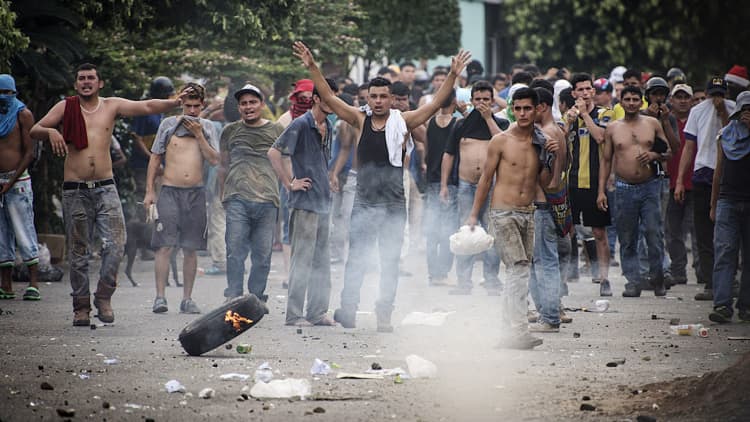The Venezuelan government donated $500,000 to President Donald Trump's inauguration fund despite on-going economic and political turmoil that has spouted the worst protests in years and a rising death toll.
Newly released records show that the Citgo Petroleum, a U.S.-based subsidiary of the Venezuelan state-owned oil company PVDSA, was one of the biggest corporate donors to the swearing-in ceremony, ranking with the likes of JP Morgan Chase and Exxon.
The donation came under Bank of America, which contributed $1 million, according to papers filed with the Federal Election Commission.
The White House was not immediately available for comment when contacted by CNBC.
Fatal protests
The revelation comes a day after the latest in a series of violent demonstrations which have added to the country's rising death toll.
Tens of thousands of people took to the streets Wednesday to rally against President Nicolas Maduro's government and demand new presidential elections and the release of jailed opposition politicians. Meanwhile, government supporters organized their own rival demonstrations.
Three were killed in the protests, including a teenager in the capital Caracas and a woman in San Cristobal, who were shot dead. A national guardsman was also killed south of Caracas.
Venezuela's opposition leader Henrique Capriles has called for protestors to continue their plight at the "same time, same place" Thursday.
The latest fatalities bring the current death toll to at least eight, with many more injured. Anti-government protestors argue that the country's economic woes have led to further deaths still as citizens battle with escalating food, water and medical shortages.

On-going turmoil
Venezuela's oil-rich economy has suffered heavily since the fall in oil prices in 2014 and has since struggled to uphold the economy, resulting in inflation escalating to more than 800 percent.
Protestors blame Maduro's socialist government for its failure to return the country to stability and accuse him of undermining the country's democracy.
The latest series of protests were triggered by a decision by Venezuela's Supreme Court last month to remove power from the opposition-controlled parliament.
Despite reversing the decision three days later, the ruling further fuelled government opposition.
Maduro accused protestors Wednesday of trying to revive the 2002 coup against his predecessor President Hugo Chávez, which killed 20 people and injured over 110, but said that he would not retreat under a "corrupt and interventionist right-wing."
Elections in Venezuela are not due until late 2018. However, Maduro's continued position is likely to increasingly depend on the willingness of the armed forces to suppress protest.
According to a note from Teneo Intelligence, officers may become increasingly reluctant to stave off a political coup due to potential legal repercussions, which could further undermine the country's stability.
"Many agents and officers will be fearful of the eventual legal consequences of violently suppressing protests.
"There is also disquiet within the FANB (National Bolivarian Armed Forces of Venezuela) over the use of colectivos, or criminal groups loosely aligned with Chavismo that the government often uses as enforcers.
"Given the question marks over the security forces' loyalty, and their importance to staving off the government's collapse, the outlook – even in the short-term – is now deeply uncertain."


